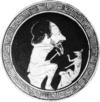- Aesop
-
/ee"seuhp, ee"sop/, n.c620-c560 B.C., Greek writer of fables.
* * *
Supposed author of a collection of Greek fables, almost certainly a legendary figure.Though Herodotus, in the 5th century BC, said that he was an actual personage, "Aesop" was probably no more than a name invented to provide an author for fables centring on beasts. Aesopian fables emphasize the social interactions of human beings, and the morals they draw tend to embody advice on how to deal with the competitive realities of life. The Western fable tradition effectively begins with these tales. Modern editions list some 200 Aesopian fables. Aesop, with a fox, from the central medallion of a kylix, c. 470 BC; in the Gregorian ...Alinari/Art Resource
Aesop, with a fox, from the central medallion of a kylix, c. 470 BC; in the Gregorian ...Alinari/Art Resource* * *
▪ legendary Greek fabulistthe supposed author of a collection of Greek fables (fable), almost certainly a legendary figure. Various attempts were made in ancient times to establish him as an actual personage. Herodotus in the 5th century BC said that he had lived in the 6th century and that he was a slave, and Plutarch in the 1st century AD made him adviser to Croesus, the 6th-century-BC king of Lydia. One tradition holds that he came from Thrace, while a later one styles him a Phrygian. An Egyptian biography of the 1st century AD places him on the island of Samos as a slave who gained his freedom from his master, thence going to Babylon as riddle solver to King Lycurgus, and, finally, meeting his death at Delphi. The probability is that Aesop was no more than a name invented to provide an author for fables centring on beasts, so that “a story of Aesop” became synonymous with “fable.” The importance of fables lay not so much in the story told as in the moral derived from it.The first-known collection of the fables ascribed to Aesop was produced by Demetrius Phalareus in the 4th century BC, but it did not survive beyond the 9th century AD. A collection of fables that relied heavily on the Aesop corpus was that of Phaedrus, which was produced at Rome in the 1st century AD. Phaedrus' treatment of them greatly influenced the way in which they were used by later writers, notably by the 17th-century French poet and fabulist Jean de La Fontaine (La Fontaine, Jean de).* * *
Universalium. 2010.
